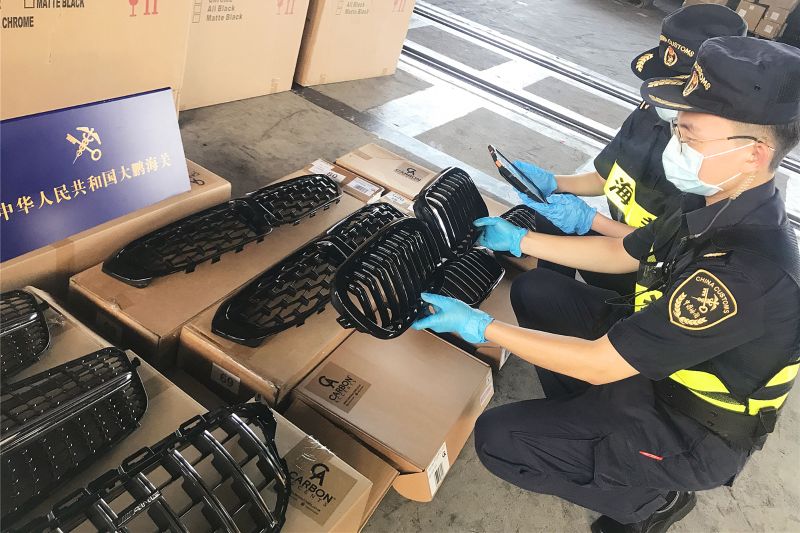54,900 tons of imported foods disinfected
Writer: Han Ximin | Editor: Holly Wang | From: Shenzhen Daily | Updated: 2020-10-21

Officers with Dapeng Customs check a batch of seized fake items. Shenzhen Customs
The centralized warehouse in Nanwan Subdistrict, Longgang District, has disinfected the packaging of 54,900 tons of imported frozen meat and aquatic products in two months since it was put into operation, Shenzhen Special Zone Daily reported yesterday.
A total of 50,403 samples have also been tested for COVID-19. A batch of goods, 1,390 pieces in total, was barred from entering the warehouse after the samples were tested positive.
The city upgraded its COVID-19 prevention and control measures since Aug. 18, requiring all imported frozen meat and aquatic products to go through package disinfection, and selected samples of them to take nucleic acid tests at the centralized warehouse before they are kept, processed or put into market. The move was made following confirmation of COVID-19 infection in three people of a Hema Fresh outlet in August.
The warehouse at Youxin Food City covers an area of 3,500 square meters. According to Zhang Hongchi, a member of the coordination and supervisory team, the warehouse operates 24 hours a day. The 58-member team is divided into seven working groups responsible for site supervision, coordination, information registration, disinfection and transportation. Another 30 professionals are responsible for sampling and testing the goods.
“Before arrival of the cargo, importers can make a reservation for entering the warehouse, the whole process from registration, testing to checking out is traceable,” Zhang Yan, a member of the information group, said.
In registration, the product owners must fill in the required information of the goods, and the drivers and destinations for the goods. If they knowingly provide false information, their actions will be included into the city’s social credit system.
The goods in the warehouse can only be distributed after passing checks and tests, and obtaining certificates. Those without the certificates will not be allowed to be kept, sold or processed in Shenzhen.
Upon arrival of the cargo, professionals wearing protective clothing will start disinfection of the packaging and take out samples for testing. The results of the tests can be returned in two hours. It generally takes a minimum of 6.6 hours, on average, for the process of checking in and checking out a batch of products.
“The centralized supervision and disinfection not only effectively controls the risks of spreading by preventing the virus going down stream to the business operators and consumers, but also improves the efficiency in handling frozen meat through centralized testing and disinfection,” said Yang Guowu, deputy chief of Shenzhen Food Safety Expert Committee.